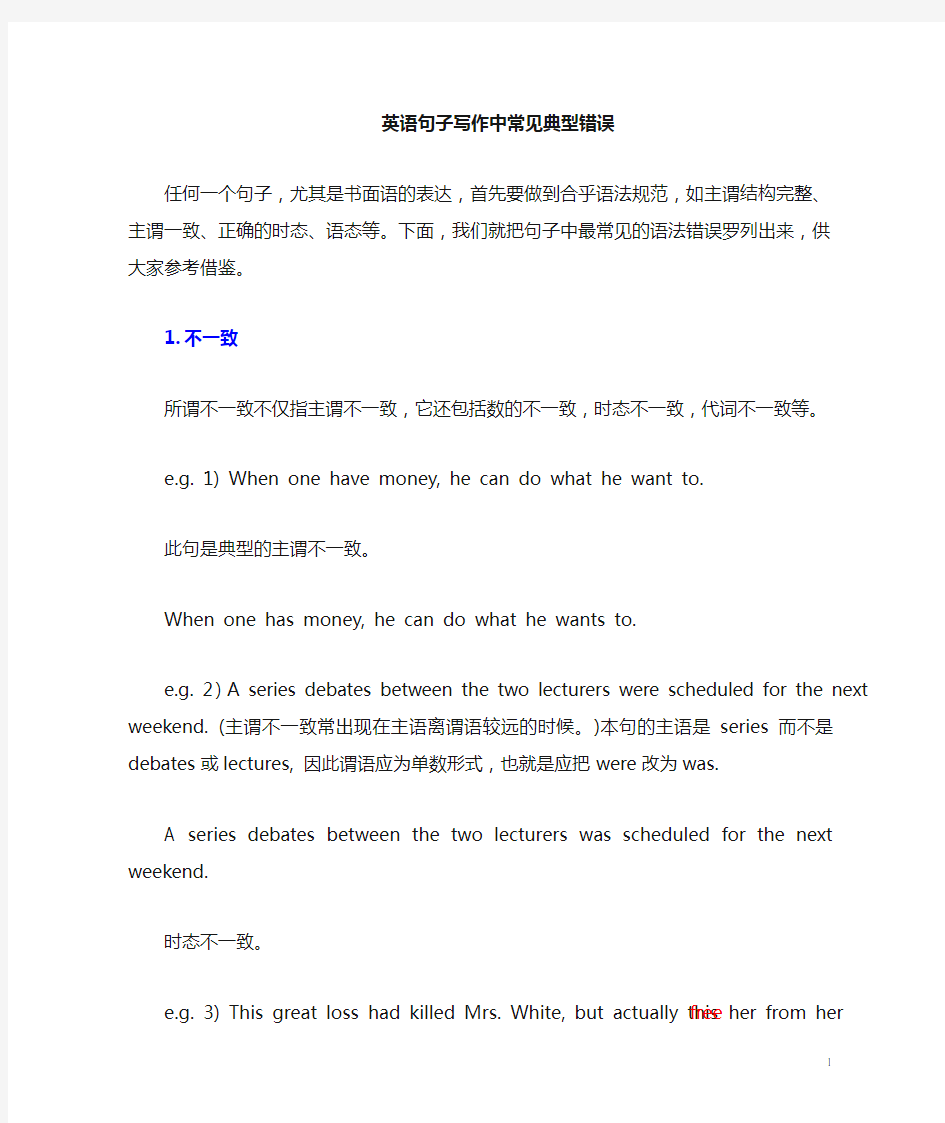
英语写作中常见20个典型错误
- 格式:doc
- 大小:51.50 KB
- 文档页数:6


英语句子写作中常见典型错误
任何一个句子,尤其是书面语的表达,首先要做到合乎语法规范,如主谓结构完整、主谓一致、正确的时态、语态等。下面,我们就把句子中最常见的语法错误罗列出来,供大家参考借鉴。
1.不一致
所谓不一致不仅指主谓不一致,它还包括数的不一致,时态不一致,代词不一致等。
e.g. 1) When one have money, he can do what he want to.
此句是典型的主谓不一致。
When one has money, he can do what he wants to.
e.g. 2)A series debates between the two lecturers were scheduled for the next weekend. (主谓
不一致常出现在主语离谓语较远的时候。)本句的主语是series而不是debates或lectures, 因此谓语应为单数形式,也就是应把were改为was.
A series debates between the two lecturers was scheduled for the next weekend.
时态不一致。
e.g. 3) This great loss had killed Mrs. White, but actually this free her from her husband.
This great loss had killed Mrs. White, but actually this freed her from her husband.
比较对象不一致。
e.g. 4) The average life span in the 1980’s was much longer than 1880’s.
The average life span in the 1980’s was much longer than in the 1880’s.
指代不一致
e.g. 5) And we can also know the society by serving it yoursel
f.
And we can also know the society by serving it ourselves
.
2.2. 修饰语错位或错误
英语与汉语不同,同一个修饰语置于句子的不同位置,句子含义可能引起变化。
e.g. 1) I believe I can do it well and I will better know the world outside the campus.
I believe I can do it well and I will know the world outside the campus better.
此句中better的位置不当,应置于句末。
定于从句关联词使用错位;不定贯词使用不当。
e.g. 2) Writing a essay is difficult for students who English is a second language.
Writing an essay is difficult for students whose English is a second language.
正确使用现在分词作状语能使句子结构多样化,但不可以滥用。
e.g. 3) While celebrate their 20th anniversary in the restaurant, the wine glass broke and damaged Mr. White’s finger.
While Mr. White celebrating their 20th anniversary in the restaurant, the wine glass broke and damaged his finger.
When Mr. White celebrated their 20th anniversary in the restaurant, the wine glass broke and damaged his finger.
3.句子不完整
在口语中,交际双方可借助手势、玉器、上下文等,即使不完整的句子也可以被理解。
可是书面语就不同了,句子结构不完整会令意思表达不清楚。
e.g. 1) There are many ways to know the society. For example by TV, radio, newspaper and so
on.
后半句不是一个完整的句子,仅为一些不连贯的词语,不能独立成句。
There are many ways to know the society, for example, by TV, radio, and newspaper.
e.g. 2) Many students have a hard time passing all the tests to get into college. For example,
my friend in high school.
Many students like my friend in high school have a hard time passing all the tests to get into college.
4. 词性误用
词性误用常表现为介词当动词用,形容词当副词用,名词当动词用等。
e.g. 1) None can negative the importance of money.
其中negative是形容词,无用作动词。
None can deny the importance of money.
e.g. 2) I did not know what was happened in the classroom.
I did not know what had happened in the classroom.
5. 指代不清
指代不清主要指指示代词与被指代的人或物关系不清,或者先后所用的代词不一致。
e.g. 1) Mary was friendly to my sister because she wanted her to be her bridesmaid.
Mary was friendly to my sister because she wanted my sister to be her bridesmaid.
句首的主语与后边的逻辑关系不清楚。
e.g. 2) At the age of ten, my grandfather died.
At the age of ten悬垂修饰语的逻辑主语不清。
When I was ten, my grandfather died.
e.g. 3) To do well in college, good grades are essential.
To do well in college的逻辑主语不清楚。
To do well in college, a student’s good grades are essential.
To do well in college, a student needs good grades.
6. 措辞毛病